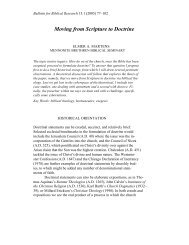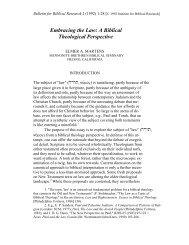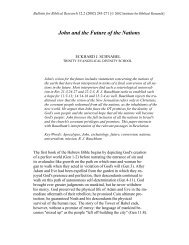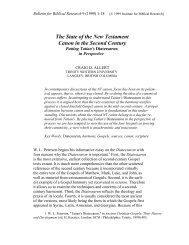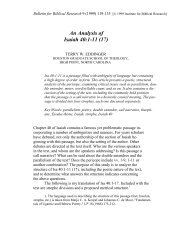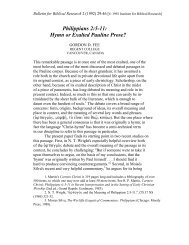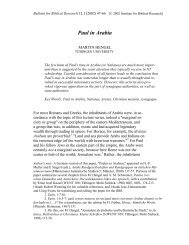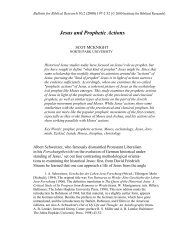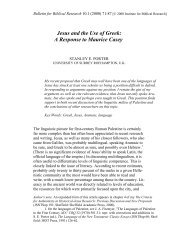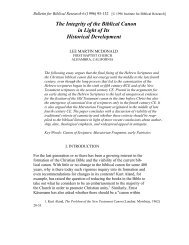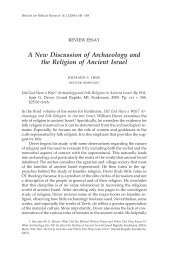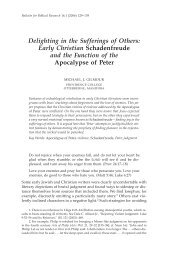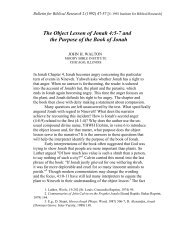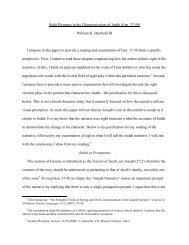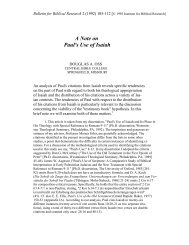Reflections on Exegesis and Spirituality in Philippians 4:10-20
Reflections on Exegesis and Spirituality in Philippians 4:10-20
Reflections on Exegesis and Spirituality in Philippians 4:10-20
You also want an ePaper? Increase the reach of your titles
YUMPU automatically turns print PDFs into web optimized ePapers that Google loves.
FEE: To What End <strong>Exegesis</strong>? 79<br />
mutual c<strong>on</strong>siderati<strong>on</strong>: (1) that faithful biblical exegesis must, by the<br />
very nature of the documents themselves, always take <strong>in</strong>to account<br />
the Spiritual purposes for which they were written, <strong>and</strong> (2) that this<br />
exegesis bel<strong>on</strong>gs with<strong>in</strong> the framework of the believ<strong>in</strong>g community,<br />
with those who follow (whether exactly or not, at least <strong>in</strong>tenti<strong>on</strong>ally)<br />
<strong>in</strong> the tra<strong>in</strong> of the orig<strong>in</strong>al believ<strong>in</strong>g communities for whom <strong>and</strong> to<br />
whom these documents were written.<br />
Thus let us say with uncharacteristic passi<strong>on</strong>: the ultimate aim of<br />
exegesis (as I perceive it) is to produce <strong>in</strong> our lives <strong>and</strong> the lives of<br />
others true <strong>Spirituality</strong>, <strong>in</strong> which God's people live <strong>in</strong> faithful fellowship<br />
both with <strong>on</strong>e another <strong>and</strong> with the eternal <strong>and</strong> liv<strong>in</strong>g God <strong>and</strong><br />
thus <strong>in</strong> keep<strong>in</strong>g with God's own purposes <strong>in</strong> the world. In order to do<br />
this effectively, I would further argue (but will not take the time to<br />
do so here), true "<strong>Spirituality</strong>" must precede exegesis as well as be the<br />
f<strong>in</strong>al result of it. We must beg<strong>in</strong> as we would c<strong>on</strong>clude, st<strong>and</strong><strong>in</strong>g under<br />
the text, not over it with all of our scholarly arrogance <strong>in</strong>tact. And<br />
we must end that way as well, or all is vanity, chas<strong>in</strong>g after the w<strong>in</strong>d.<br />
I would therefore make bold to <strong>in</strong>sist that proper exegesis should<br />
be d<strong>on</strong>e <strong>in</strong> the c<strong>on</strong>text of prayer, so that <strong>in</strong> our exegesis we hear the<br />
text with the sensitivity of the Spirit. Only as we ourselves do our<br />
exegesis <strong>in</strong> the proper posture of humility—<strong>on</strong> our knees, as it were,<br />
listen<strong>in</strong>g to God—can we truly expect to speak the Word of God with<br />
clarity <strong>and</strong> boldness so as to comfort, <strong>in</strong>spire, or speak prophetically<br />
to God's people, the people for whom these texts were written <strong>in</strong> the<br />
first place.<br />
So with this c<strong>on</strong>fessi<strong>on</strong> <strong>and</strong> proposal before us as the c<strong>on</strong>text of<br />
this lecture, what I hope to do <strong>in</strong> the space that rema<strong>in</strong>s is to illustrate<br />
what some of this might look like by look<strong>in</strong>g at a specific passage,<br />
Phil 4:<strong>10</strong>-<strong>20</strong>, <strong>and</strong> assess<strong>in</strong>g its role <strong>in</strong> Paul's letter to the <strong>Philippians</strong>.<br />
I beg<strong>in</strong> with a few words about the term <strong>Spirituality</strong>.<br />
II. ON THE MEANING OF SPIRITUALITY 4<br />
As the result of my work <strong>on</strong> the pneu=ma word group <strong>in</strong> the letters of<br />
Pau1, 5 I have found myself becom<strong>in</strong>g more <strong>and</strong> more distressed by<br />
our translat<strong>in</strong>g of the adjective pneumatiko/j with a small-case letter,<br />
"spiritual." Indeed, the word spiritual is what I call an accordi<strong>on</strong> word:<br />
its mean<strong>in</strong>g pretty much has to do with how much air you pump <strong>in</strong><br />
4. Some of this material has already appeared <strong>in</strong> my "<strong>Exegesis</strong> <strong>and</strong> <strong>Spirituality</strong>:<br />
<str<strong>on</strong>g>Reflecti<strong>on</strong>s</str<strong>on</strong>g> <strong>on</strong> Complet<strong>in</strong>g the Exegetical Circle," Crux 31 (1995) 29-35, which was the<br />
published versi<strong>on</strong> of the first of the Ongman Lectures noted above. These lectures<br />
were given aga<strong>in</strong> <strong>in</strong> somewhat altered form as the Huber Drumwright Lectures at the<br />
Southwestern Baptist Theological Sem<strong>in</strong>ary <strong>in</strong> October 1995.<br />
5. See my God's Empower<strong>in</strong>g Presence: The Holy Spirit <strong>in</strong> the Letters of Paul (Peabody:<br />
Hendricks<strong>on</strong>, 1994), especially the analysis of the word group <strong>in</strong> chap. 2.



